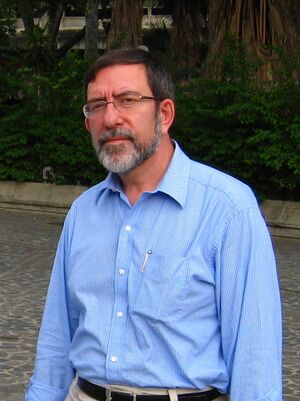Philip Dimitrov
( politician) | |
|---|---|
 | |
| Born | 31 March 1955 Sofia, Bulgaria |
| Nationality | Bulgarian |
| Alma mater | University of Sofia |
| Member of | Club de Madrid, US/Department/State/International Visitor Leadership Program, WEF/Global Leaders for Tomorrow/1993 |
Filip Dimitrov Dimitrov' is a Bulgarian writer, diplomat, and former Prime Minister during the 1990s, a decade-long economic collapse.
He was selected a Global Leader for Tomorrow by the World Economic Forum in 1993.
Early life
After school at the English High School in Sofia, he studied law at the Kliment of Ohrid University in Sofia from 1973, from which he graduated in 1977. He then completed postgraduate studies in individual and group psychotherapy.
From 1979 to 1990 he worked as a lawyer in Sofia and as such from 1989 to 1990 he was the secretary of the Bar Association.
Political career
Dimitrov began his political career in 1990 after the collapse of the communist government of Todor Zhivkov as a member of the 1990 newly founded anti-communist Union of Democratic Forces (SDS). From August to December 1990 he was Deputy Chairman and from December 1990 to December 1994 Chairman of the National Coordinating Council of the SDS and thus Chairman of the SDS.
On October 13, 1991, opposition parties achieved a majority in the parliamentary elections for the first time.[1] On November 4, 1991, he was appointed prime minister by President Shelyu Shelev, succeeding Dimitar Popov. He held that post until December 30, 1992, when he resigned after having support witthdrawn from the Rights and Freedoms Movement. He asked a vote of confidence in Parliament and lost the vote.
On January 15, 1992, the Dimitrov government recognized the former Yugoslav Republic of Macedonia, now North Macedonia, under the then constituent name Republic of Macedonia.[2] During his tenure, former Prime Minister Andrei Lukanov was arrested in July 1992 on suspicion of illegal enrichment.
As chairman of the SDS, he took a hardline anti-communist course, refusing any cooperation with the Bulgarian Socialist Party, the successor to the Bulgarian Communist Party. His attempts to overthrow the successor government of Lyuben Berov, supported by the BSP and DPS, failed.
His government started establishing a free market system, which literally changed most Bulgarian cities within half a year. He insisted on the large-scale restitution of nationalized properties, and his government made the first practical steps allowing citizens to re-claim property that had been confiscated by the state.
According to his opponents, Dimitrov is responsible for the collapse of the Bulgarian agriculture after 1991 by restoring the land of the state-owned cooperative farms to its legitimate owners immediately instead of allowing a gradual transition from state-owned to private-owned agriculture. The problem was that all of these owners were old people, who received small pieces of land, and they had no machinery and physical strength to cultivate these lands. The infrastructure of the cooperative farms (water systems, machines, buildings etc.) was left without any supervision, and it was quickly destroyed and stolen. This had a devastating effect for the Bulgarian agriculture. The production of agricultural goods collapsed, many people in the agriculture sector became unemployed, and the population in the Bulgarian villages dropped."
After the heavy defeat of the SDS in the parliamentary elections on December 18, 1994, he had to hand over his office as party chairman to Ivan Kostov.
In February 1997 he became a member of the SDS Executive Council for Relations with Non-Governmental Organizations. After his return from the USA he became a member of the National Council of the SDS in March 2002.
Later political career
He was subsequently also elected as a member of the National Assembly from 1992 to 1997. As a Member of Parliament he was a member of the Committee on Foreign Relations and European Integration and also a member of the Parliamentary Delegation for Relations with the European Parliament.
In May 1997 he resigned from the National Assembly and instead became Permanent Representative to the United Nations (UN). He then became Ambassador to the United States in July 1998. He was accredited as such in Washington until January 2002.
On 25 June 2005 he was elected a deputy to the 40th National Assembly, where he is again the SDS deputy for the Sofia constituency. In 2005 he was elected Vice-President of the National Assembly.
From 1 January 2007 to 5 June 2007, he was one of Bulgaria's interim MEPs in the European Parliament, following Bulgaria's accession to the European Union[3].
On September 15, 2010, Catherine Ashton announced that Filip Dimitrov will become EU Ambassador to Georgia.[4]
On September 15, 2015 he was nominated as a judge at the Constitutional Court of the Republic of Bulgaria.[5]
References
- ↑ http://www.spiegel.de/spiegel/print/d-13492411.html
- ↑ https://web.archive.org/web/20080620045515/http://members.lycos.co.uk/sfsk/
- ↑ https://www.europarl.europa.eu/meps/de/37526
- ↑ http://www.consilium.europa.eu/uedocs/cms_data/docs/pressdata/EN/foraff/116509.pdf
- ↑ https://www.mediapool.bg/prezidentat-izlachi-mariana-karagyozova-i-filip-dimitrov-za-ks-news239290.html
Wikipedia is not affiliated with Wikispooks. Original page source here